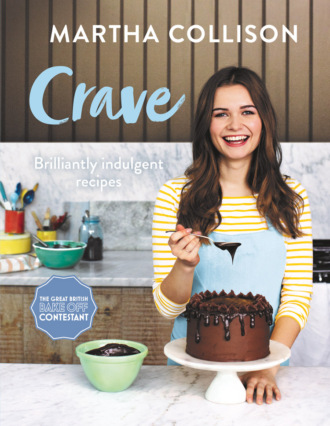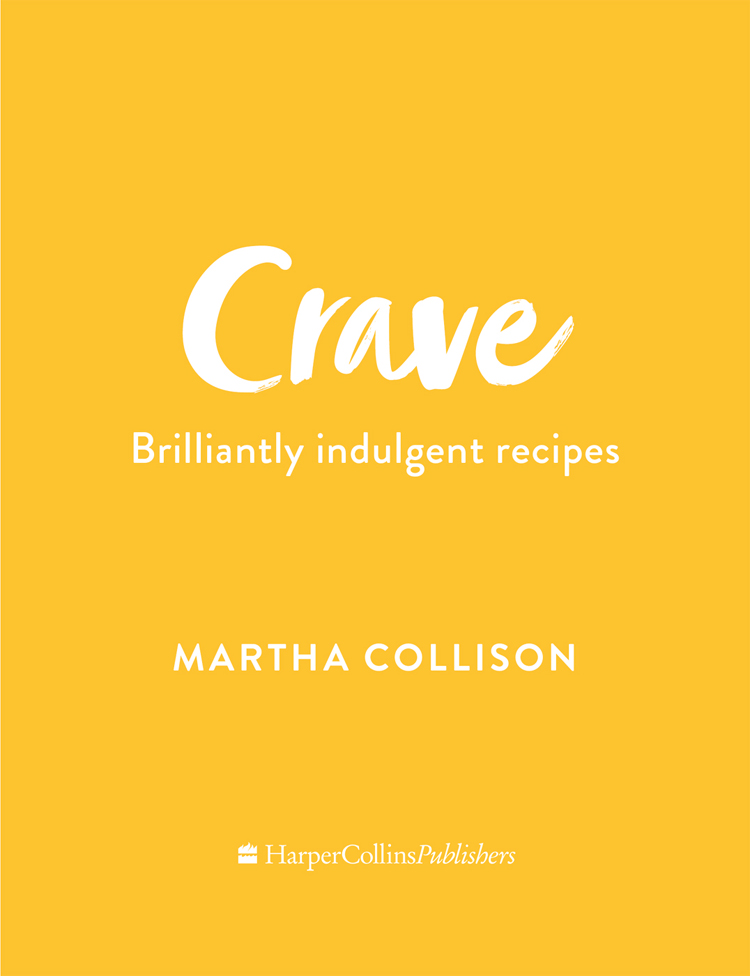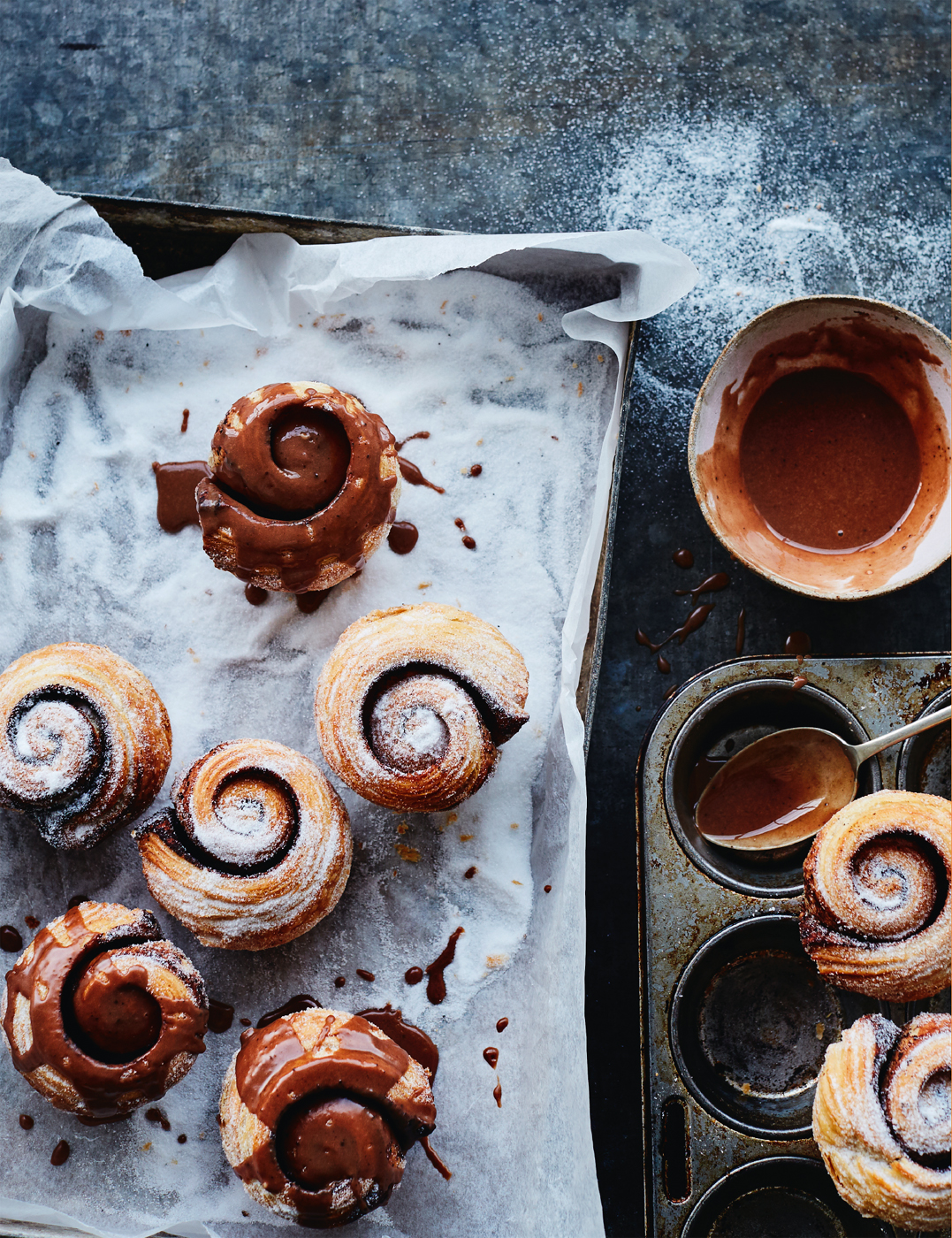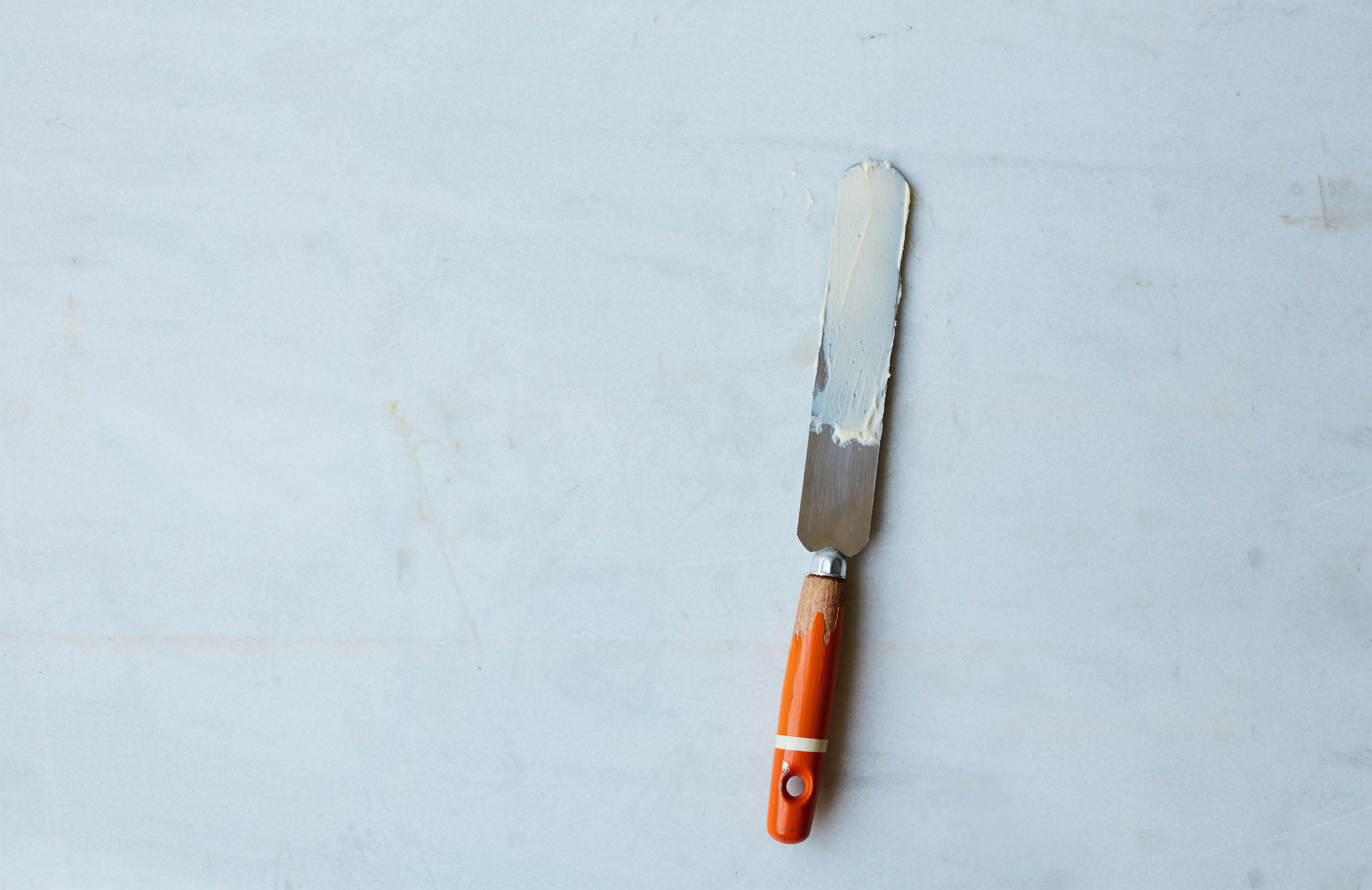
Полная версия
Crave: Brilliantly Indulgent Recipes


Copyright

HarperCollinsPublishers
1 London Bridge Street
London SE1 9GF
www.harpercollins.co.uk
First published by HarperCollinsPublishers 2017
FIRST EDITION
© Martha Collison 2017
Cover layout design © HarperCollinsPublishers
Cover photograph © Laura Edwards
A catalogue record of this book is available from the British Library
Martha Collison asserts the moral right to be identified as the author of this work
All rights reserved under International and Pan-American Copyright Conventions. By payment of the required fees, you have been granted the nonexclusive, non-transferable right to access and read the text of this e-book on screen. No part of this text may be reproduced, transmitted, downloaded, decompiled, reverse engineered, or stored in or introduced into any information storage retrieval system, in any form or by any means, whether electronic or mechanical, now known or hereinafter invented, without the express written permission of HarperCollins e-books.
Find out about HarperCollins and the environment at www.harpercollins.co.uk/green
Source ISBN 9780008238636
Ebook Edition © June 2017 ISBN 9780008238643
Version 2017-05-31

Contents
Cover
Title Page
Copyright
Introduction
How to use this book
Equipment
Ingredients
Citrus
Understanding Citrus
Limoncello Brandy Snap Curls
Lemon and Pistachio Cheesecake Pots
Coconut and Lime Teacup Puddings
Caramelised Marmalade French Toast
Lime and Ginger Drizzle Cake Traybake
Lemon and Poppy Seed Pancake Stack
Orange, Pistachio and Pomegranate Cakes
Grapefruit and White Chocolate Possets with Shortbread
Lemonade Marshmallows
Lemon Meringue Profiteroles
Preserved Lemon and Olive Focaccia
Lemon and Lime Battenberg
Fruit
Understanding Fruit
Mini Doughnut Muffins
Quick Berry Crumbles
Mango and Prawn Filo Cups
Honey Scones with Rhubarb Compote
Peaches and Cream Cupcakes
Sweet and Sour Apple Crisps
Passionfruit Viennese Whirls
Raspberry Crêpe Cake
Blackcurrant and Peanut Macarons
Persian Fruit Cake
Coconut Custard Tart with Caramelised Pineapple
Cherry and Marzipan Pie
Nut
Understanding Nuts
Hazelnut and Chocolate Spread
Honey and Sea Salt Roasted Nuts
Peanut Butter Cookies
Coffee Bean and Almond Brittle
Amaretti Biscuits
Sticky Maple Pecan Pudding
Frangipane Puff Pastry Pies
Pecan Praline Brownies
Flourless Hazelnut Torte
Baklava
Chocolate and Peanut Butter Roulade
Peshwari Naan Breads
Nutty Chocolate Babka
Spice
Understanding Spices
Plain Popcorn
Oriental Satay Popcorn
Piri-Piri Popcorn
Snickerdoodle Cookies
Fire Fries with Raita Dip
Gingerbread Blondies
Spiced Milk and Honey Cake
Speculoos Cookies
Speculoos Cookie Spread
Chilli Chocolate Churros
Pumpkin Spice Cupcakes
Cumin and Sesame Crackers with Whipped Goat’s Cheese
Sugar and Spice Doughnuts
Chilli and Garlic Flatbreads
Chai Tea Panna Cotta
Cardamom Knots
Eggnog Layer Cake
Chocolate
Understanding Chocolate
Gooey Sharing Cookie
Lacy Pancakes with Raspberry Sauce
Mint Chocolate Mousses
Toasted Marshmallow Flapjacks
Brigadeiros
Chocolate Crackle Cookies
Self-Saucing Chocolate Pudding
Earl Grey, Caramel and Chocolate Loaf Cake
Mississippi Mud Pie
Triple Chocolate Éclairs
Caramelised White Chocolate Cake
Death by Chocolate Cake
Mocha Cruffins
Caramel
Understanding Caramel
Salted Caramel Sauce
Hot Chocolate with Caramel Pretzel Bites
Brown Sugar Beignets
Honeycomb Cups
Salted Caramel Cornflake Bars
Giant Stroopwafels
Caramel Madeleines with Buttered Rum Sauce
Brown Butter Caramel Tartlets
Malted Millionaire’s Slices
Butterscotch Thumbprint Cookies
Treacle Tart
Burnt Caramel Banana Bread
Coffee Caramel Monkey Bread
Sticky Toffee Pudding Cake
Cheese
Understanding Cheese
Baked Époisses Fondue with Prosciutto Dippers
Parmesan and Chipotle Crisps
Smoked Cheddar Welsh Rarebit
Tartiflette Potato Skins
Triple Cheese Gougères
Butternut Squash and Feta Empanadas
Cherry and Chocolate Cheesecake Brownies
Cheese and Marmite Sausage Rolls
Mini Pork and Stilton Pies
Fig and Manchego Loaf
Gouda and Smoked Paprika Pretzels
Stuffed Bagelballs
Alcohol
Understanding Alcohol
Tiramisu Pots
Bramble Crêpes Suzette
Amaretto Syllabubs
Brandy Butter Bread Pudding
Whiskey Rye Chocolate Chip Cookies
Bourbon Biscuits
Cherry Kirsch Soufflés
Pisco Sour Angel Food Cake
Mai Tai Rum Babas
Espresso Martini Cheesecake
Mulled Wine Pavlova
Irish Cream Pretzel Cake
Gin and Tonic Lime Pie
List of Searchable Terms
Acknowledgements
About the Publisher

Introduction
I have loved food for as long as I can remember. I was the child who looked forward to grocery shopping because I loved to see all the fresh fruits piled precariously in displays and to marvel at the number of intricately shaped pasta varieties in their colourful packets. Trailing slowly behind my mum, I’d wander through the aisles trying to sneak the new foods that I was curious to try into the trolley. I couldn’t (and still can’t) make it home with an intact baguette, as resisting the temptation to tear off the knobbly end and sink my teeth into the golden crust encasing the soft, chewy bread was beyond me. I’d spend Sunday afternoons thumbing through my mum’s Nigella collection, devouring the pages with my eyes and picking out recipes to try to persuade my parents to let me make.
I was the girl who always had a hot school dinner because I hated the mundane predictability of a packed lunch. Taking my plastic tray up to the hatch and choosing a meal that I felt like eating was an experience to which I would look forward with great anticipation. The food may not have been incredible, but I had the choice of what I ate, and I loved it. In restaurants, I’d always ask for a spare plate rather than a meal of my own so I could sample everyone else’s food at the table instead. I adored having a little taste of everything. I remember being sorely disappointed when I became too old for the empty-plate approach to be socially acceptable and had to order my own food. I couldn’t relate to fussy eaters, as the thought of not knowing how a new food sitting on my plate tasted was an alien concept to me. I’ve been fascinated by flavour and had a thirst to understand food for longer than I’ve been able to cook it.
My earliest memory of a craving (embarrassing as this is for a baker who valiantly aims to champion homemade cooking) is butterscotch Angel Delight. I was transfixed by the kitchen magic that occurred; how whisking a beige powder with cold milk would transform it into a thick, cloudy mass with an unnatural, gelatinous texture. My sister and I adored it, and the artificial buttery flavour evokes a certain nostalgia that I’ve struggled to replicate. We crave the things we love; the foods that make us happy. That’s how the idea for this book was born.
Crave is a book focused on my love affair with food; on glorifying ingredients in their purest form as well as showing how to combine flavours to create sensational bakes. Living in an age crammed full of dieting and healthy-eating cookbooks, I was desperate for a change, and I hope Crave offers just that. This is a book that should speak to that inner voice we all have which asks ‘What do I really feel like eating?’ It is aimed squarely at loving, appreciating and celebrating food for what it is, without an ounce of guilt for indulging the body and mind in what they desire. By no means am I suggesting that you throw healthy eating out of the window and base your diet on these recipes; I am fully supportive of eating a balanced, nutritious diet. However, I am also a firm believer in the importance of treating yourself every now and again. Food, especially baking, should be fun! This book is full of recipes that will satisfy your cravings on those self-indulgent days.
Cravings are a curious phenomenon. What starts as an insignificant little niggle at the back of your mind, gently hinting at the kind of food needed to hit the spot, can quickly grow into a compulsion that demands to be satisfied. The kind that drives you out of bed in the middle of the night to raid the fridge for a morsel of cheese, or causes you to sneak away from your desk in a desperate hunt for a square of chocolate to go with your coffee. This book is organised into chapters focused on eight of the most common cravings: Citrus, Fruit, Nut, Spice, Chocolate, Caramel, Cheese and Alcohol. Starting with recipes for refreshing citrus breakfasts to start the day with vigour, through ambrosial caramel delights to satisfy even the sweetest tooth, and ending with dark and devious ways to imbue delectable bakes with alcoholic tipples, there is something here to sate every appetite.
In the words of Virginia Woolf:
‘One cannot think well, love well, sleep well, if one has not dined well.’
Crave is everything I love about baking. I bake to please, to nurture, to comfort, to entertain and, most importantly, to enjoy, and I hope that radiates through these pages.
How to use this book
I bake with immediate consumption in mind. I’m an impatient baker, and I want to be rewarded for my toils as quickly as possible – whether that is with a super-quick bake or by sneaking a spoonful of hot gooey brownies fresh from the oven before they have had the chance to cool. The three categories of recipes represent the different amounts of time needed to create bakes to satisfy your cravings. You’ll notice the headers at the top of each recipe page.

These recipes take less than 20 minutes. They are go-to quick treats that can be rustled up in next to no time when you need something to hit the spot. You’ll find clever tips and shortcuts to help speed up your favourite bakes.

Taking less than an hour to create from start to finish, these include everything from amazingly quick cakes to biscuits and savoury snacks. These are the recipes that you can always sneak a bite from while they cool, if you can’t wait any longer.

These recipes take over an hour, allowing plenty of time for more lengthy baking processes, such as proving and rising, and for flavours to steep right into bakes. These are recipes that truly reward the patience you expend and will not disappoint you.
The key to fitting these recipes into the allotted time is preparation. Set out and measure all your ingredients before you begin so you don’t waste time scouring the kitchen for a missing item or get halfway through and realise you’ve run out of something vital. Do the same with your equipment, so that once you are in the swing of things, everything is within easy reach. Remember to preheat the oven before you start, too. I have timed and tested these recipes vigilantly to make sure they are achievable in the time specified. Some might take a little practice at first, but your go-to recipes will soon become second nature.
Some flavours are perfect partners and it’s a regular occurrence for me to find myself craving not one but two (or even more!) flavours and ingredients – dark chocolate and orange, warming spices and caramel, or savoury cheese with sweet fruit. I’ve flagged these classic combos with small icons on the recipe pages.

Equipment
My kitchen is bursting at the seams with equipment, some that I use every single day and couldn’t bear to be without, and some that sits gathering dust for most of the year. This is a list of my essential kit, the things I use on a regular basis that aid my baking.
Electric mixers
Electric hand-held whisks and stand mixers are a godsend. They make cake making so much quicker, and are essential for tasks like whipping egg whites and making light buttercreams. Electric hand-held whisks are more affordable than stand mixers, but if you bake a lot, a stand mixer such as a KitchenAid or Kenwood kMix is a worthwhile investment: it will revolutionise the way you bake.
Wire cooling racks
Often overlooked, wire racks are really important in making sure whatever you’ve put time and effort into baking yields the very best results. Elevating a hot bake allows air to circulate and prevents condensation from forming, avoiding sogginess and helping the bake cool evenly and quickly.
Baking tins
Perhaps the most essential kit. They come in all shapes and sizes, so it can be daunting choosing which ones to invest in. The tins I regularly use and recommend purchasing are round 18cm and 20cm deep loose-bottomed tins, ideally three of each so you don’t have to bake in batches for a multilayered cake. A 20 × 20cm square tin, 450g loaf tin, 12-hole muffin tin, 24-hole mini muffin tin, pie dish and a 20 × 35cm traybake tin are also useful.
Baking trays and baking sheets
Although they are very similar, baking trays and sheets serve different purposes so I have both in my kitchen. Baking trays have a lip around the edge to prevent whatever you’re baking rolling off the edge (ideal for roasting nuts). Baking sheets are completely flat, so there is more surface area to bake cookies or biscuits.
Jars, bags and boxes
I always have an array of glass jars, presentation bags and cake boxes on hand so that anything I bake can be easily packaged as a gift. Jars need sterilising before you fill them. To do this, simply wash them thoroughly in hot soapy water, rinse with clean water then dry them completely in an oven preheated to 110°C/90°C fan/gas 1/4 (this will take 5–10 minutes) before filling.
Food processors
These are handy for both sweet and savoury cooking. They cut the time it takes to chop nuts and create purées, and can even make pastry without you getting your hands dirty. Powerful processors are expensive, so for a more budget-friendly option, go for a mini food processor or stick blender with a chopping bowl attachment, which are perfect for blitzing small quantities of nuts, dough or praline for ‘instant’ recipes.
Ice-cream scoops
I use ice-cream scoops for so much more than scooping ice-cream. In fact, it is probably one of my most-used pieces of kitchen equipment. I have three sizes and they are ideal for making even-sized cupcakes, perfectly circular cookies and distributing batters between cake tins.
Palette knives
To get a beautiful, smooth finish on iced cakes, you will need a palette knife. I have a larger one for smoothing the edges of my cakes, and a mini offset knife for adding detail to the top of cakes.
Piping bags and nozzles
I use disposable piping bags as they’re so handy – you can snip off the end of the bags once filled, creating holes of various sizes without always needing to use a nozzle. Where I suggest a disposable bag, do use a reusable piping bag if you prefer. For icing cupcakes and large cakes, my favourite nozzles are open and closed stars, as they create a beautiful ruffled effect.
Baking parchment and baking sheet liners
I find lining tins time-consuming and a real chore, so I buy pre-cut circles of baking parchment the same sizes as my round tins. They reduce preparation time and are ideal for my ‘Instant’ and ‘Soon’ recipes. I cover baking sheets with a reusable non-stick baking liner to save the need to grease them.
Digital scales
Reliable, good-quality digital scales are a must. Baking is a science that requires accuracy to obtain good results, so inaccurate scales will limit you.
Measuring spoons
A common measurement people get wrong is teaspoon and tablespoon measures, as it is very easy to overestimate or underestimate spoon measures if you’re weighing by eye or using ordinary cutlery. Get hold of a cook’s measuring spoon set.

Ingredients
Fresh, good-quality ingredients raise an average bake to a great one and really make it sing. These are my top storecupboard ingredients which I make sure I always have in stock.
Eggs
The humble egg is the most versatile ingredient in baking. It can be used to bind mixtures, aerate puddings, thicken custards and set into firm structures like meringue. I use medium free-range eggs in my recipes unless otherwise stated. Fresh eggs yield the lightest, fluffiest bakes, so use your freshest eggs for making cake batters. Slightly older eggs will make brilliant meringues or macarons. Store your eggs at room temperature for baking – egg whites and yolks combine much more easily at room temperature and will disperse through batter more smoothly.
Butter
Butter is my favourite ingredient by far to use in baking. Its rich, full flavour is what makes caramels so moreish and ganache so smooth. I always use salted butter in baking unless otherwise specified. I find the saltiness is the perfect partner for sweet and savoury recipes and it’s what I spread liberally on my toast, so its something I always have to hand. Unsalted butter is necessary in some cases – buttercreams and delicate pastries can be overwhelmed by salt, so keep this in mind. Use the butter at the temperature that the recipe states – cold for pastry and room temperature for sponge or buttercream – as this can make or break a bake.
Milk
Many chefs specify whole milk for baking, but if you don’t normally have it in the fridge, don’t buy it especially unless the recipe specifies it. Whole milk has a high percentage of butterfat (a minimum of 3.5%) so can yield a creamier result, but semi-skimmed milk (1.5–1.8% butterfat) will still do the job. I often use semi-skimmed milk to make bakes, and it works perfectly.
Raising agents
Baking powder and bicarbonate of soda are the two raising agents I use to make bakes rise or spread out. For any chemistry geeks like me who want to know how they work, here’s a brief explanation. A reaction between an acid and a base creates carbon dioxide bubbles, which cause a cake mixture to rise. Bicarbonate of soda is a base, so an acidic ingredient needs to be present in the mixture for it to react with to create the bubbles. Lemon juice, buttermilk or cocoa powder, among many others, do the trick. Baking powder is a combination of bicarbonate of soda (a base) and cream of tartar (an acid), so both the acid and base required for the reaction are already present, and your bake will rise with no further assistance.
Salt
There are many different kinds of salt available, so it can be confusing to know what’s best for baking. Fine table salt is generally what’s called for, as its fine texture can evenly disperse throughout bread dough and cake batter. Sea salt has a better flavour and is perfect for adding a final flourish to caramels, breads and snacks.
Sugar
From clouds of white icing sugar to clumps of moist, fudgy, soft, dark brown sugar, there are so many varieties of the sweet stuff that, when used in baking, produce completely different results. Caster sugar is the most commonly used in this book as its fine texture and neutral flavour provide a great base for most sweet recipes. I try to buy Fairtrade sugar to ensure that it is grown and harvested ethically (it is rarely pricier than standard sugar).
Yeast

